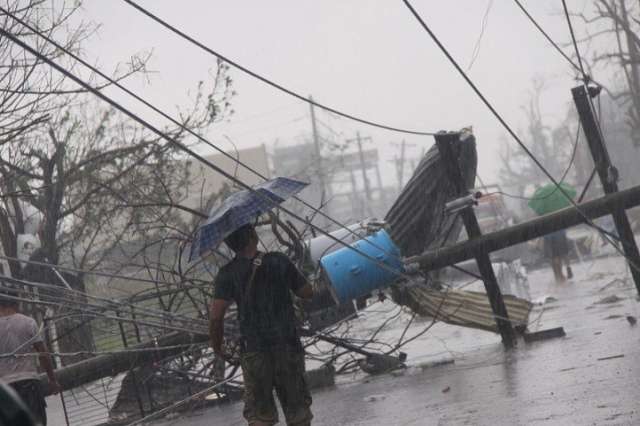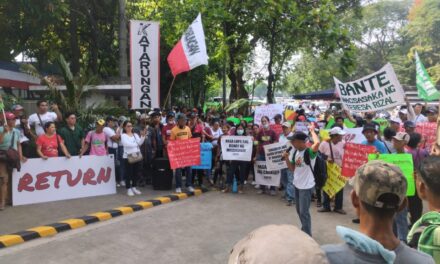With its exposure to extremely violent typhoons that have taken thousands of lives, the Philippines has become the poster child for the malevolent effects of climate change. This has conferred a kind of moral authority on the Philippine delegations to the climate talks over the last few years.
Thus it’s not surprising that a drastic sudden shift in the country’s climate policy has drawn much international attention and comment. In many ways, these changes are illustrative of the dilemmas and issues that many developing countries grapple with as they cope with the climate crisis.
The first whiff that observers got that a crisis was unfolding was during the December climate negotiations in Lima, when several NGOs lost their accreditation as members of the official Philippine delegation.
Then, when the talks began, the country’s most high-profile negotiator was nowhere to be seen. Commissioner Naderev “Yeb” Sano’s absence was noted by many members of other delegations, since he had come to personify the crisis of the countries most vulnerable to climate change with his much-publicized fasting during the Doha talks in December 2012 (when typhoon Pablo, aka Bopha, hit Mindanao) and the Warsaw meeting in November 2013 (when Yolanda, or Haiyan, ravaged Tacloban and the Visayas).
Sano’s combined negotiating skills and strong moral stance made him a particularly effective negotiator, according to many insiders who could not understand his absence. Moreover, was it a coincidence, they asked, that the disaccredited NGOs had been known to work closely with Sano?
Asked for what accounted for Sano’s absence, Susan Yap, one of the members of the delegation, said her understanding was that he had been asked to remain behind to prepare two long overdue reports for the UN climate body. On the other hand, at a report-back on the Lima talks organized by Focus on the Global South on December 19, Sano said he still had not received an official reason why he was cut out of the Philippine delegation.
Still others told me privately that it had to do with “personal differences” with Lucille Sering, vice chairperson of the Philippine Climate Change Commission. It was widely known that Sering had strongly criticized Sano for his hunger strike during the Warsaw talks in 2013.
The “Philippine Pivot”
Much speculation linked Sano’s absence to the Philippines’ withdrawal from the “Like-Minded Developing Countries Group” (LMDC) to head up the “Vulnerable Countries Forum” — a move that was described by some members of the government delegation as the “Philippine pivot.”
Sano had been the official most visibly identified with the LMDC, which is an informal sub-grouping within the Group of 77 and China noted for its insistence that historically high-polluting developed countries should be the first to make mandatory cuts in their emissions. Sano acknowledged his high-profile leadership role in the LMDC, saying this stemmed from the Philippines’ perceived role as an “honest broker” among the different blocs of countries in the climate talks.
Asked why the Philippines left the LMDC during a press conference in Lima, Sering told Reuters: “We were never part of it. I never met them.” According to civil society observer Denise Fontanilla, this answer surprised many, since “the Philippines has been widely recognized as one of the key countries behind the LMDC, joining statements and submissions and even making submissions in behalf of the group.”
Another explanation for the Philippines’ departure from the group was provided by Gary Domingo, assistant secretary of the Philippine Department of Foreign Affairs. “We wanted more flexibility in our negotiating positions,” said Domingo, “especially since we are going to be the chair of the Group of 77 and China next year.” Domingo also hinted that the Philippines’ departure from the LMDC was orchestrated by President Benigno Aquino III himself.
Indeed, in a brief address to the UN Climate Summit in New York last September, Aquino departed from the standard LMDC line of laying the burden of making cuts on the rich countries. “It would be wrong…to engage in another protracted debate over the individual commitments of countries,” Aquino asserted. “Instead, everyone here has to do everything they can to address climate change, without first waiting for their neighbors to engage in action.”
Tony La Vina, a prominent member of the Philippine delegation, gave yet another reason. “We can’t side with China in our geopolitical context, and we can’t side with the OPEC countries,” he said. “Our days with the LMDC were numbered. It was just a matter of time when we would leave.” La Vina, who is dean of the prestigious Ateneo School of Government, played the central role in the Lima negotiations in the absence of Sano and Bernarditas Muller, another leading negotiator who was also identified closely with the LMDC. Muller was “adopted” by the Bolivian delegation for the Lima talks.
In place of the LMDC, the Philippines accepted the chairmanship of the Vulnerable Countries’ Forum, a grouping of some 20 countries from Asia, Africa, and Latin America that are said to be the most drastically affected by climate change. At a press conference in Lima called to mark the country’s acceptance of the leadership of the group, Sering said that while the “developed countries have the bigger burden” to cut emissions, developing countries which “have the capacity to do so” also had to reduce emissions. “We cannot just limit ourselves to a few countries,” she said, saying the Philippines would make its proposed emissions cuts in the lead-up to the decisive climate talks in Paris next December.
Strategic Retreat?
To veteran climate activist Lidy Nacpil, who was also in Lima, the government’s reasons for leaving the LMDC were not good enough.
“The Like Minded Countries is a diverse bloc,” she explains. “It is wrong to characterize it as a homogeneous bloc dominated by China. There are other members, like the countries of ALBA,” she added, referring to the Venezuelan-led Bolivarian Alternative for the Americas).
Nacpil worried that the Philippines’ leaving the LMDC and its “calling on everyone to do its share” was part of a bigger picture of “strategic retreat” of the global South from the principle of “common but differentiated responsibilities,” which places the onus of cutting back on greenhouse gas emissions on the developed countries.
Other civil society activists voiced the fear that in leaving the LMDC, the Philippines was “not so much building bridges to other groups but burning bridges” to important global players. It was asserted by several participants in the December 19 forum that it was the manner of leaving — that is, loudly proclaiming it as a “pivot” — that was perhaps more damaging than the policy change itself. China, it was pointed out, also executed a “pivot” in coming up with an emissions reduction deal with the United States prior to the Lima talks, a move that departed from the LMDC line. However, “it did not loudly disown old alliances like the Philippines did,” said one civil society observer.
Bad Deal?
Disagreement over the departure from the LMDC was one of the reasons for the increasingly rancorous split between the government delegation and many civil society organizations that marked the final days of the conference. A related reason was that the government negotiators, according to the activists, were all too eager to agree to the Lima Call for Climate Action, even if it did not mention or slurred over many of the demands that the Philippines had traditionally fought for.
For the Philippine Movement for Climate Justice (PMCJ), a network of some 190 non-governmental organizations, the Lima Declaration is unacceptable because it failed to call for increased emissions cuts, imposed no responsibility on developed countries to provide “resources to those who suffer from climate change,” and put forth “no mechanism for ensuring that those most responsible for climate change can be compelled to increase their pledged targets if they fall short of what is required by science and equity.”
Indeed, the PCMJ accused the Philippine government of “breaking ranks from the majority of other developing countries and with many climate justice organizations, and choosing to line up instead with the U.S., EU, other rich countries, and a small number of developing countries.” In so doing, “the Philippine government threw its considerable moral weight behind a draft ‘decision text’ that sells Filipinos — and others most affected by climate change — down the river.”
This attack on the government delegation was unprecedented in its harshness. It could mark a passage from relatively close cooperation to antagonism between the government and the civil society contingents to future climate talks.
Hard Questions
The climate policy of the Philippines has undergone what can only be characterized as a seismic shift. Not surprisingly, the events in Lima have elicited questions from many Filipinos concerned with how the country is coping with what has been described as the greatest challenge to humanity.
What is the country’s climate policy? How is it set? Who decides who composes the official delegation? Why was Yeb Sano, described in international quarters as an “ace negotiator,” excluded from the delegation to Lima? Why did the Philippine delegation sign on to a weak document that seems to serve the interests of the big polluters, especially China and the United States? Why did the Philippines leave the Like Minded Developing Countries group?
On this last question, I must admit that I was initially pleased with the news that the Philippines had gotten out of the LMDC, since I felt that the LMDC was holding the country hostage to China’s refusal of all mandatory cuts. I have long advocated that the Philippines join with other countries tired of being pawns in great power climate politics to press mandatory cuts on both developed countries like the United States and big emerging market polluters like China and India.
But I was soon disabused of my enthusiasm when I heard the details of the Philippine “pivot.” Telling everyone they should simply voluntarily pledge to make cuts and decide for themselves what amounts to offer will simply encourage the big polluters to continue spewing greenhouse gases and place us on course to catastrophic climate change. There is simply no substitute for deep mandatory cuts by both the historical and the current carbon villains.
What many Filipinos see as the key lesson stemming from the crisis of Philippine climate policy is that it can no longer be the preserve of only a few government specialists and selected non-governmental organizations. There must be greater citizen participation in setting and monitoring policymaking. This is urgent, since the country must have a well thought-out and democratically decided national policy to bring to the critical climate talks in Paris in December 2015, which will set up a climate regime to succeed the Kyoto Protocol.
Just like war can never be left to the generals, so climate negotiations cannot be left to negotiators.
Source: Foreign Policy in Focus








